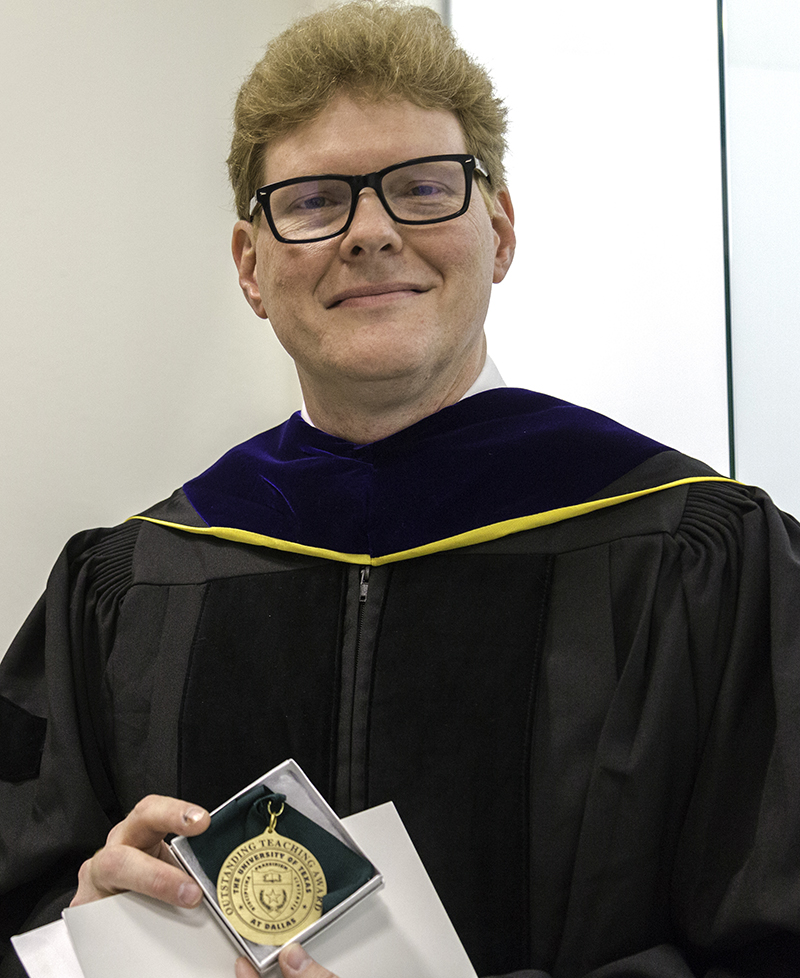Trio of Researchers, Including UTD Chemist, Wins $1.1-Million Grant to Study Nanoparticles
By: Office of Media Relations | April 18, 2005
RICHARDSON, Texas (April 18, 2005) – An international trio of scientists, including a chemist from The University of Texas at Dallas (UTD), has won a three-year, $1.1-million grant from a French science foundation to conduct collaborative research of nanoparticles, with an emphasis on possible bio-medical applications of such particles and their potential effects on the human body.

Dr. Gregg R. Dieckmann, assistant professor of chemistry at UTD, is one of the recipients of a Young Investigators Award from the Human Frontier Science Program, an organization located in Strasbourg, France. Dieckmann will share the award money with Dr. Alan B. Dalton, a lecturer in the Department of Physics at the University of Surrey in England, and Dr. Johnny Coleman, a lecturer in the Physics Department of the University of Dublin in Ireland.
Grants provided by the program support basic research in the life sciences, with an emphasis on novel, innovative approaches that involve scientific exchanges across both national and disciplinary boundaries. Grant recipients, all of whom are promising scientists early in their careers, are expected to develop new lines of research through their collaboration.
Dieckmann and his colleagues plan to design and create proteins that will interact with carbon nanotubes, cylinders made of graphite that are many thousands of times thinner than a human hair and have remarkable electrical, thermal and structural properties. The proteins, amino acid sequences known as peptides, will be used to coat the nanotubes to allow them to be separated and more easily manipulated, as well as to explore their use in a range of molecular medical applications.
“One aspect of our research will involve targeting peptide-wrapped carbon nanotubes to specific cell types, with the intent of using the thermal properties of the nanotubes to destroy the targeted cells,” Dieckmann said. “If successful, the research could lead to new, non-invasive treatments for cancer and other diseases.”
The trio of researchers also will assess what, if any, toxicological effects the peptide-wrapped carbon nanotubes have on living cells.
Dieckmann hopes that by wrapping carbon nanotubes with peptides, the resulting combination will become more “bio-friendly,” thus expanding possible uses in the human body.
“We expect to advance the understanding of the synthetic-biological materials interface for molecular medical applications,” he said. “This work should have wide-ranging impact in the life sciences, especially where nanoparticles are used as in vivo imaging agents, chemical sensors, drug delivery devices and artificial tissues.”
Dieckmann will be assisted in his research by other faculty members associated with the university’s Bio-Nanotechnology Group, including Dr. Ray H. Baughman of the UTD NanoTech Institute and Chemistry Department, Dr. Rockford K. Draper of the Molecular and Cell Biology and Chemistry Departments, and Dr. Inga H. Musselman and Dr. Paul Pantano, both of the Chemistry Department.
Dieckmann joined the faculty of UTD in 1999. He earned a Ph.D. degree and an M.S. degree, both in chemistry, from the University of Michigan, and a B.A. degree, with a dual major in chemistry and computer science, from DePauw University. He did postdoctoral work in biochemistry and biophysics at the University of Pennsylvania.
About UTD
The University of Texas at Dallas, located at the convergence of Richardson, Plano and Dallas in the heart of the complex of major multinational technology corporations known as the Telecom Corridor®, enrolls more than 14,000 students. The school’s freshman class traditionally stands at the forefront of Texas state universities in terms of average SAT scores. The university offers a broad assortment of bachelor’s, master’s and doctoral degree programs. For additional information about UTD, please visit the university’s web site at www.utdallas.edu.
Media Contact:
Office of Media Relations, UT Dallas, 972-883-2155, newscenter@utdallas.edu, or the Office of Media Relations, UT Dallas, (972) 883-2155, newscenter@utdallas.edu.





